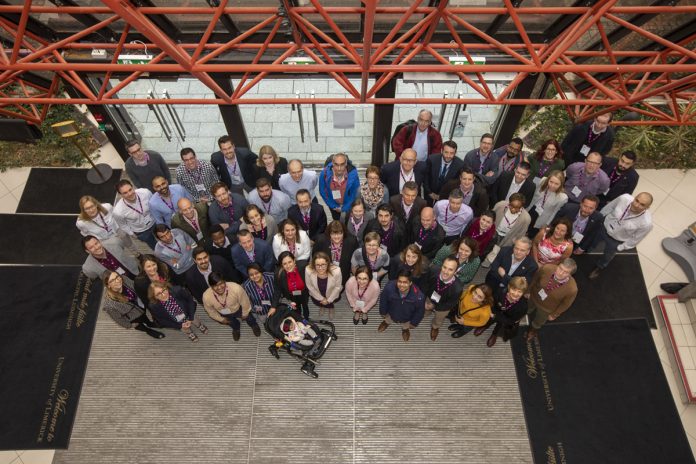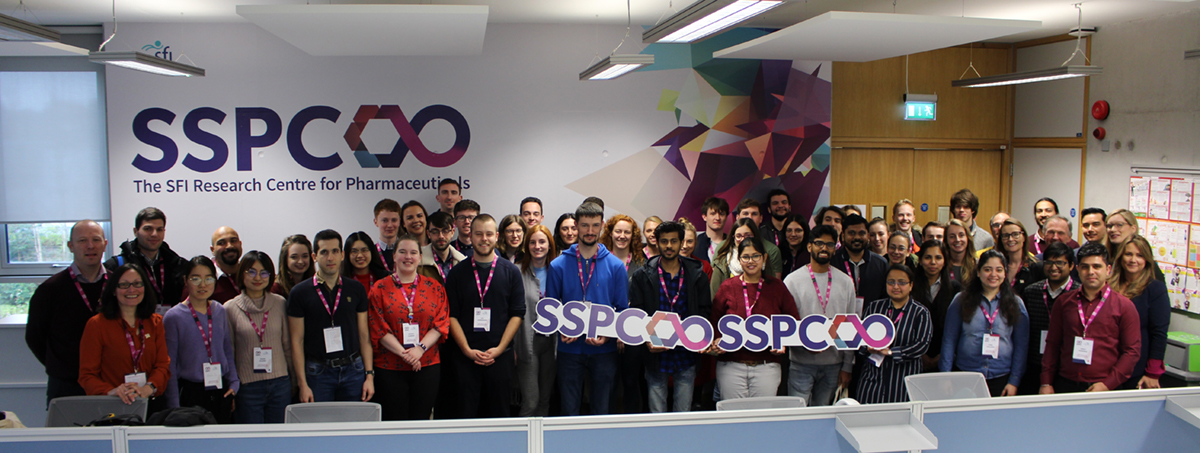Louise O’Neill from SSPC, the SFI Research Centre for Pharmaceuticals, underlines the importance of training the next generation of highly skilled pharmaceutical scientists and engineers in Ireland
SSPC, the Science Foundation Ireland (SFI) Research Centre for Pharmaceuticals, is a hub of Irish research expertise developing innovative technologies to address key challenges facing the pharmaceutical and biopharmaceutical industry. The aim of SSPC is to deliver industry-relevant technical solutions, which result in job growth and retention within this sector in Ireland and grow the skills base of qualified scientists and engineers.
The research carried out by SSPC crosses the pharmaceutical production chain from molecule to medicine, with the objective of gaining a better understanding of mechanisms, controlling processes, and predicting outcomes for the efficient and environmentally sustainable production of safe medicines. Specific areas of expertise include catalysis for organic synthesis, flow chemistry, theranostics, informed formulation for poorly soluble drugs, crystallisation, solid form selection, continuous manufacturing, peptide/protein production routes and characterisation, novel reactor technology, process, molecular and mathematical modelling.
SSPC PhD Industrial Placement Programme
SSPC trains and produces PhD graduates and post-doctoral researchers with specific disciplinary expertise, coupled with a broad understanding of cognate disciplines across pharmaceutical science and manufacturing. Future pharmaceutical skills requirements are becoming increasingly demanding, requiring a flexible and agile workforce.
The SSPC PhD Industrial Placement Programme reflects this, with each student offered the opportunity of taking a short-term (three to six months) industry placement with an industry partner, offering a mutually beneficial arrangement for both the student and industry partner. In fact, the professional links established between SSPC PhD students and various industry partners during the placement period often continue post-placement. SSPC also retains ties to its graduates by tracking their transition from academia to industry as a first and/or second destination. Industry cites the programme as a driver in solving industrial problems and the opportunity to access emerging talent for the industry.
Tom O’Ceallaigh, Director of Engineering, MSD, said: “MSD has recently hired a number of PhD graduates from SSPC and intends to hire more in the future. Many PhD students in SSPC who have been exposed to the innovative and applied research projects with industry along with new technologies are well-positioned to take up particular positions in companies like MSD.”
SSPC is the only research centre to provide industry placements as a part of their PhD programme. The programme goes far beyond the curricular requirements of a number of accredited modules and a research thesis and brings the voice of industry into the programme, forging explicit links between PhD candidates and pharmaceutical companies, ultimately transforming research into practice.
Dr Carol McCarthy, who completed her PhD in drug dissolution from mesoporous silica system in 2018 at University College Cork, added, “I undertook a three-month industrial placement with Pfizer, Newbridge. As a member of the Technical Services Department, I was able to apply the technical and problem-solving skills I had gained in the academic environment to an industrial setting. SSPC also provided funding for me to travel to Purdue University, Indiana, U.S. as a Visiting Scholar to the Taylor Lab in the summer of 2018. Prof Lynne Taylor is a world leader in my field so it was an amazing opportunity to collaborate with her and receive her feedback and guidance.”
PhD and post-doctoral researcher working groups
The support given to the next generation is next to none, PhD and postdoctoral researcher who join the Centre become a part of working groups. These professional groups give the researchers a strong voice within SSPC and externally, promote in-centre collaboration, support personal and professional development.
Ryan Craig, Recipient of SSPC’s PhD Graduate of the Year award, said, “The ability to discuss my research with other principal investigators from different institutes throughout Ireland, as well as leading industry experts was made possible by being part of SSPC. The experience gleaned from these interactions has made a considerable impact on my career choice to date. The insight I gained from attending SSPC events, highlighting how academic research can help deliver industry-relevant solutions, inspired me to pursue a career in the pharmaceutical sector.”
Ryan joined the Centre at Trinity College Dublin in 2013 and is now working as an SSP Process Chemist at SK Biotek, Ireland.
Education and Public Engagement activities
SSPC actively fosters a culture of inclusivity and equity of sharing across all domains, including Education and Public Engagement (EPE). This whole-centre approach facilitates on-going and effective participation of researchers in the SSPC EPE Programmes. Driving this ethos are the SSPC community of managers and investigators, who instil an expectation in all members of the SSPC community to contribute to the various facets of the centre. To this end, various EPE activities initiate a chain of crucial impacts for the wider community, such as societal, economic, human capacity, international engagement, policy and public service, and professional services, to name a few. PhD and postdoctoral researchers get the opportunity to volunteer on the many events run by SSPC.
Dr Udaya Khandavilli, SSPC’s Education and Public Engagement Champion 2019, said, “In the course of doing outreach activities, I have also been able to learn from school children and the many people I have met. Naturally, people have a particular phobia when it comes to science, and some students do not want to pursue science as they think science-related courses are often too challenging, but due to our engagements with them, we have been able to change their notion and attitude towards science, for me that was really worth so much.”
Conclusion
SSPC supports and produces an industrially relevant and ready workforce for the pharmaceutical and biopharmaceutical industry. On 28th of November, SSPC welcomed over 50 new postgraduate and post-doctorate members for an Induction event at the University of Limerick. These researchers, from our nine partner institutions across Ireland, are embarking or continuing their research careers with SSPC in line with our Phase II expansion supported by Science Foundation Ireland. Based on the experience of previous graduates of SSPC, the future is bright for these researchers: to-date we have achieved a 100 % employment rate for over 200 SSPC graduates with 70% choosing industrial career paths after leaving SSPC. This is primarily due to the integration of industry across all elements of SSPC Centre activities through our extensive industry membership program. We also enjoy a global reach with over 40% of graduates progressing internationally, almost exclusively to global pharmaceutical companies.
SSPC is led by the University of Limerick at the Bernal Institute, in partnership with University College Cork, National University of Ireland, Galway, Trinity College Dublin, Dublin City University, University College Dublin, Waterford Institute of Technology, Maynooth University and Royal College of Surgeons Ireland.
To find out more, visit www.sspc.ie
Please note: This is a commercial profile












